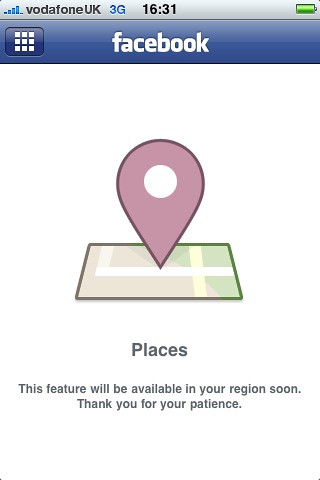Facebook Places; Haven't We Been Here Before?
A week and a half ago Facebook finally launched their Places feature to a predictable media furore over location privacy, regardless of whether it's justified or not and, to location industry watchers at least, a strong sense of deja vu. Haven't we been here before?
Let's look at the key issues that seem to be getting people hot, bothered and generally up in arms.
Deja vu the first. According to Facebook, at the time of writing they have 500M users. But how many of them will actually use the service, regardless of whether they've updated their privacy settings?
Deja vu the second. So you decide you want to use Facebook Places? Only on an iPhone I'm afraid or from Facebook's HTML5 mobile web site. Want an Android or Nokia app? You're out of luck, for now. Want to use it outside the US? You're even more out of luck, for now.
 Deja vu the third. So you decide you don't want to use Facebook Places? It's a location app so there's bound to be privacy implications. Granted, Facebook have chosen to go down the opt-out route for location privacy, though you still have to physically use the service, but even the most cursory of web searches for "disable facebook places" yields loads of different takes on the same basic set of actions. Cult of Mac and ReadWriteWeb have great write ups, in non threatening, non technical language for how to ensure Facebook Places never sullies your Facebook stream.
Deja vu the third. So you decide you don't want to use Facebook Places? It's a location app so there's bound to be privacy implications. Granted, Facebook have chosen to go down the opt-out route for location privacy, though you still have to physically use the service, but even the most cursory of web searches for "disable facebook places" yields loads of different takes on the same basic set of actions. Cult of Mac and ReadWriteWeb have great write ups, in non threatening, non technical language for how to ensure Facebook Places never sullies your Facebook stream.
Now take a step back, re-read the three points above and substitute, in order, Google's Latitude, Foursquare's, err, Foursquare and Yahoo's Fire Eagle for Facebook Places. Granted the opt-out vs. opt-in approach to location sharing differs substantially (for Latitude, Foursquare and Fire Eagle it's implicitly opt-in) but we've been here before. Many times. A new location sharing service is launched, people get worried due to media coverage and eventually the status quo is restored and everyone gets on with their lives as before, maybe with an additional bit of location richness added, maybe not. It's worth bearing this in mind before you buy into the latest media coverage which over-uses the phrase "sparks privacy concerns".
Update 1/9/10 - turns out I'm not the only one thinking along these lines. After I originally posted this, my daily trawl through my RSS feeds uncovered a post from Jonathan Crowe over at The Map Room blog that draws pretty much the same conclusions over Facebook Places as I do.